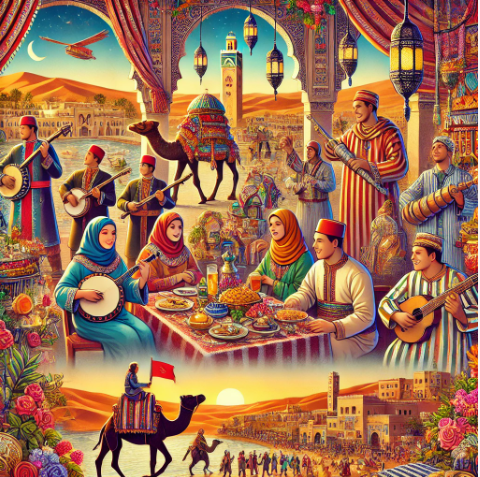
Moroccan Traditional Festivals: A Celebration of Culture and Heritage
Morocco is a land of vibrant traditions and diverse cultures, reflected in its array of traditional festivals. These festivals blend spiritual devotion, historical remembrance, and community celebration, offering a deep insight into Morocco’s identity. Below are some of the most notable traditional festivals celebrated across the country:
1. Mawlid al-Nabi (Prophet Muhammad’s Birthday)
- What It Celebrates: The birth of Prophet Muhammad.
- Traditions: Moroccans mark the day with religious ceremonies, recitation of Quranic verses, and gatherings at mosques. Families prepare special meals, and cities like Fez and Marrakech host spiritual Sufi chants and processions.
2. Eid al-Fitr (End of Ramadan)
- What It Celebrates: The conclusion of the holy month of fasting.
- Traditions: Families gather for a festive breakfast, exchange gifts, and visit loved ones. Streets come alive with joy as people wear new clothes and share sweets like chebakia (honey-drenched sesame cookies).
3. Eid al-Adha (Festival of Sacrifice)
- What It Celebrates: The willingness of Prophet Ibrahim (Abraham) to sacrifice his son in obedience to God.
- Traditions: Families sacrifice a sheep, distributing the meat among relatives, neighbors, and the less fortunate. The festival is marked by prayers, feasts, and communal bonding.
4. Moussem Festivals
Moussems are traditional gatherings held in honor of saints or local heroes, combining religious devotion with cultural festivities. Some notable Moussems include:
- Moussem of Moulay Idriss:
- Where: Moulay Idriss Zerhoun.
- What It Celebrates: The founder of the Idrisid Dynasty, Moulay Idriss I.
- Traditions: Pilgrimages, processions, and spiritual ceremonies in his honor.
- Moussem of Tan-Tan:
- Where: Tan-Tan.
- What It Celebrates: Nomadic heritage and Saharan traditions.
- Traditions: A UNESCO-recognized festival showcasing camel races, tribal music, poetry, and Amazigh crafts.
- Moussem of Imilchil:
- Where: Imilchil, High Atlas Mountains.
- What It Celebrates: A legendary love story of two Amazigh lovers.
- Traditions: Known as the “Marriage Festival,” it features group weddings, folk dances, and music.
5. Amazigh New Year (Yennayer)
- When: January 12th or 13th.
- What It Celebrates: The Amazigh agricultural calendar and cultural heritage.
- Traditions: Families prepare traditional dishes like couscous, perform rituals for prosperity, and engage in storytelling, music, and dancing.
6. Gnaoua World Music Festival
- Where: Essaouira.
- What It Celebrates: The spiritual and musical traditions of the Gnawa people.
- Traditions: Performances of hypnotic rhythms, chants, and dances by Gnawa musicians, alongside global artists, in a vibrant cultural exchange.
7. Marrakech Popular Arts Festival
- Where: Marrakech.
- What It Celebrates: Moroccan folklore and traditional arts.
- Traditions: Street performances, acrobatics, storytelling, and music in venues like the historic Jemaa el-Fnaa Square and the El Badi Palace.
8. Rose Festival
- Where: El-Kelaa M’Gouna, Valley of Roses.
- What It Celebrates: The annual rose harvest in the Dades Valley.
- Traditions: Parades, music, dancing, and markets selling rose-based products such as oils and perfumes.
9. Festival of Almond Blossom
- Where: Tafraoute.
- What It Celebrates: The blooming of almond trees in early spring.
- Traditions: Folk music, dancing, and local crafts, with the stunning pink blossoms as a backdrop.
10. Mawazine Festival (Modern and Traditional Fusion)
- Where: Rabat.
- What It Celebrates: Moroccan music and global sounds.
- Traditions: A mix of traditional Moroccan performances, including Andalusian music and Amazigh chants, alongside international artists.
11. Independence Day
- When: November 18th.
- What It Celebrates: Morocco’s independence from French and Spanish rule in 1956.
- Traditions: Official ceremonies, parades, and national pride festivities.
12. Fantasia (Tbourida)
- What It Celebrates: Traditional Moroccan cavalry.
- Traditions: Riders dressed in traditional attire perform synchronized horse charges, firing rifles in unison to showcase their skills and heritage.
Morocco’s traditional festivals are a window into its soul, blending spirituality, history, and artistic expression. These celebrations bring people together, honoring the country’s rich past and its dynamic cultural diversity. Whether through music, food, or rituals, each festival reflects Morocco’s enduring spirit and deep sense of community.